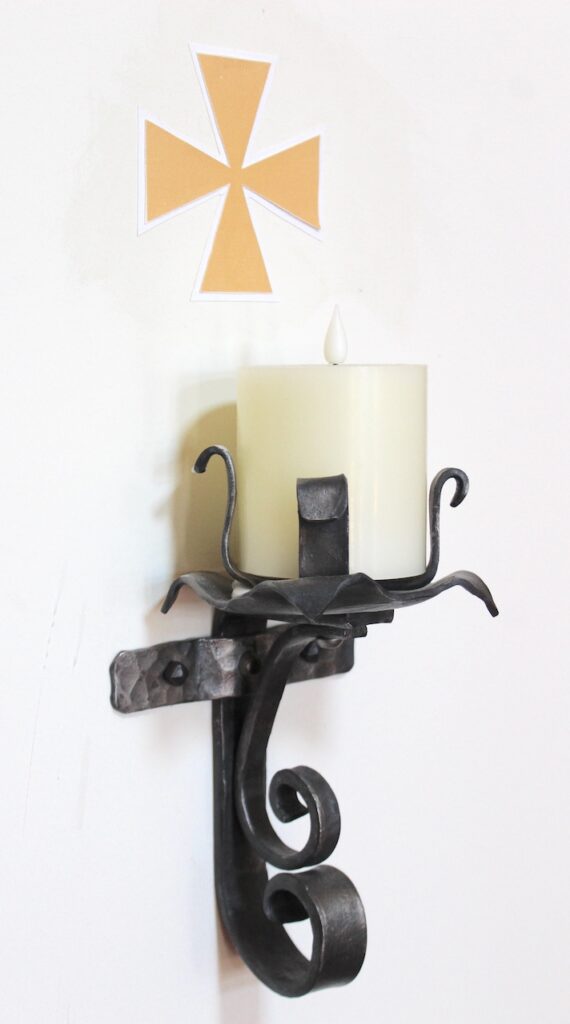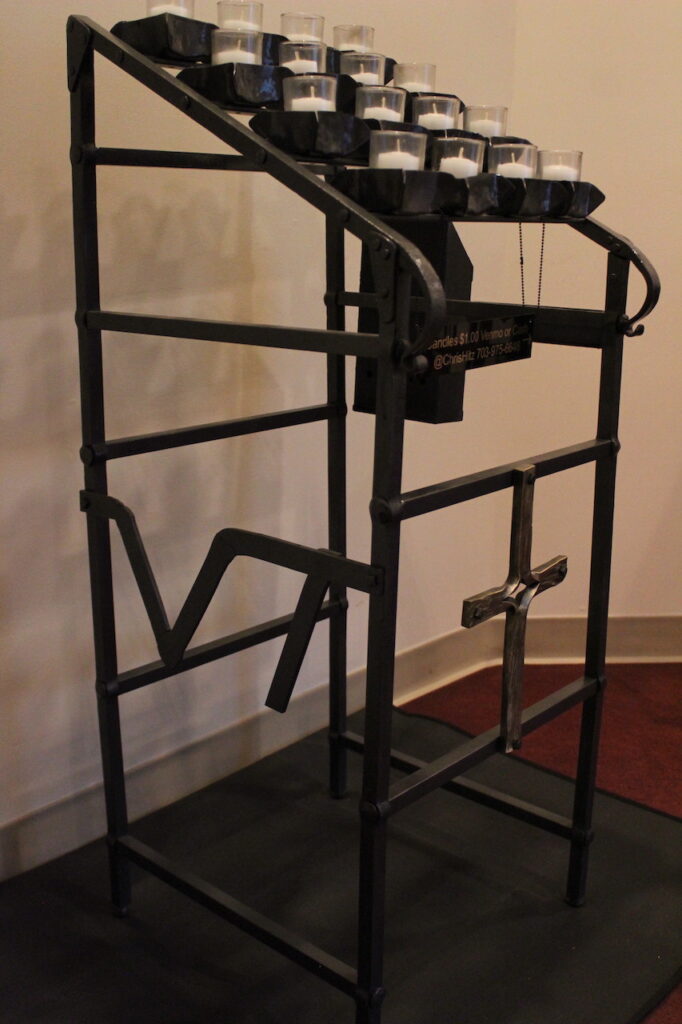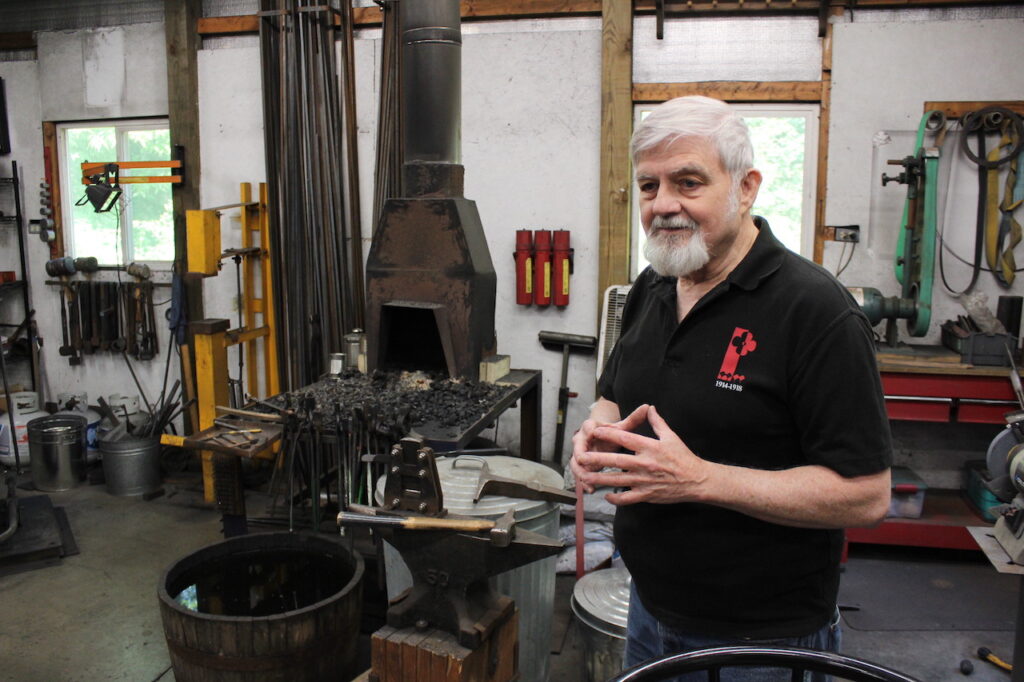Clang … clang … clang …
The sound of a man bending metal to his will along a quiet, two-lane road in Augusta County comes from a workshop about the size of a two-car garage with red walls and a white roof, hidden under a grove of oaks, hickory and cherry spreading to the sky.
Clang … clang … clang …
From rows of hammers, Dave McKinnon takes one to pound the steel he’s softened in one of his forges into a work of art, including some that now adorn the new home of St. John the Evangelist in Waynesboro. The newly-renovated church was dedicated July 4, 2021.
“Taking a piece of metal and molding it to a shape, to a design … it’s fun!” he said. “You start with a flat bar and make it into something, and you can make it into anything. There’s just so much you can do.”
What he did for his parish church was make several wall sconces, two candelabras and metal frames for two marble benches on the entrance plaza. “I enjoy doing it for the church because it’s something that’s going to be seen,” he said.
“It’s not something that someone puts in their house that no one sees,” he added. “I do like people to appreciate my work. I don’t make any money on it, so appreciation is the important thing.”
One of the people who appreciates McKinnon’s artistry is Father Rolo Castillo, who was pastor of St. John the Evangelist during its construction a few years ago. “[He’s] genuinely gifted and well-informed on many subjects,” Father Rolo said. “A true Renaissance man.”
As plans for the new building started taking shape, Father Rolo said McKinnon offered to construct some wrought-iron pieces, such as an altar rail or a courtyard gate, but the architect wanted to use his own contacts for the details.
One of the things the architect didn’t plan was obtaining sconces for the 12 locations to be anointed with chrism oil during the dedication. Father Rolo bought some online, made by 3-D printing. Shortly after they were installed, one broke and Father Rolo asked McKinnon to make replacements, consulting with him on the design. McKinnon said making the prototype that Father Rolo approved took about 20 hours; each of the others took an estimated 6-8 hours of labor.

McKinnon had previously made a Celtic cross for Father Rolo, who asked him to incorporate that design into sconces for the alcoves at St. John dedicated to Our Lady of Guadalupe and to the Divine Mercy. “It is unique artistry with flaws and imperfections that show the skill of the artist and the beauty of the medium,” Father Rolo said.
McKinnon’s next project for the church was a pair of seven-piece candelabras, kept in the chapel but also moved to the sanctuary for Holy Week and Easter services. “I am glad he loves what he does and is generous in sharing his talents,” Father Rolo said. “You don’t often get such gifts.”
Some of McKinnon’s craftsmanship helped pay for the new church. “I started doing crosses as a Lenten project, trying to remind me of the time of year and focus on that, God’s suffering,” he said. He donated several crucifixes to be raffled off for the building fund and has made hundreds of them in different styles for priests, deacons and laypeople.
As he talks about his work, the lilt of his native Braintree, Massachusetts, just outside of Boston, is in his voice. He became an electronics engineer and forged a career in the military – first on active duty in Army intelligence and then as a civilian working for a defense contractor – before retiring in 2009.
He said he got serious about his hobby about 20 years ago, getting lessons in traditional blacksmithing from expert craftsmen like the late Nol Putnam and Frederic Crist, who has a studio in Waynesboro.
“They’ve both had gates at the National Cathedral in Washington,” McKinnon said. “I’m not that good, but I’ve got my church.” He’s also gotten advice and help from Dale Morse at the Virginia Institute of Blacksmithing in Waynesboro.
“I’ve known Dave for a couple of decades now and have been one of his constant mentors since he began smithing,” Morse said. “Over the years his skills have greatly increased. He undoubtedly has a passion for the craft of blacksmithing.”
Along with the crucifixes and other religious items that have come from McKinnon’s shop are fireplace screens, weathervanes, barbecue tools, Christmas ornaments, sundials, metal morning glories, hummingbirds – all at no charge.
“It takes years to get to the point where you can get a clientele that can afford to pay you as an artist,” he said, not to mention the cost of insurance and tax liability.

Though he doesn’t seek commissions, sometimes they find him. Diocesan archivist and records manager Edie Jeter saw his work at St. John and asked if he could repair a votive candle rack for Catholic Campus Ministry at Virginia Tech. McKinnon said he could – but offered to make one even better.
A good piece, in McKinnon’s view, is “it has to have a shape that’s appealing. It has to demonstrate traditional work. I don’t want to see any arc welding on it, any welding spatter. I don’t want to even use welding unless it’s not seen.”
Against a wall, just inside the door to the Newman House chapel, is the result. On one side of the frame, holding 16 candles, is the Virginia Tech emblem. On the front is a cross made from one piece of steel, one of the hallmarks of traditional blacksmithing. A neighbor and Virginia Tech graduate, Lanny Campbell, helped with the riveting needed to assemble the rack.
“It takes patience, and you may have to do something a couple times to get it,” McKinnon said.
This man “who smooths metal with the hammer” (Isaiah 41:7) has just finished work on his latest gift to his parish, a holder for a cross – to be used during Good Friday veneration – continuing to forge and twist metal to make beautiful things for the church, items that Father Rolo believes “will outlive us all.”

